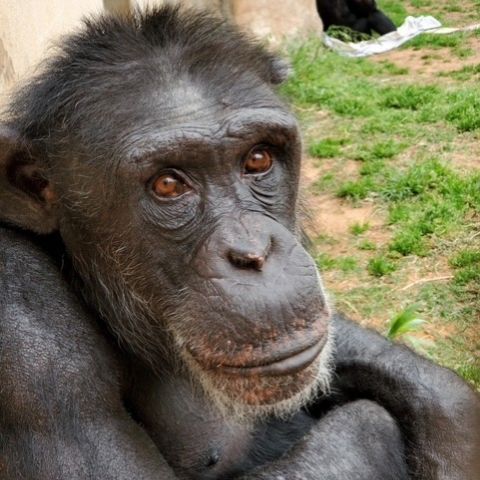Summary of OKC ZOO MOURNING THE LOSS OF ENDANGERED MALE CHIMPANZEE, MWAMI:
The Oklahoma City Zoo and Botanical Garden announced the unexpected death of Mwami, a 36-year-old male chimpanzee, from cardiac arrest following a dental procedure on February 7, 2025. Mwami had been part of the zoo since 2006 and was a key member of his troop, acting as a foster father and a role model. Despite appearing healthy after a routine health exam and dental surgery, Mwami succumbed to cardiac arrest during recovery. The zoo highlighted his engaging personality and contributions to conservation efforts through programs like the AZA’s Chimpanzee SSP. Native to Africa and currently endangered due to threats like deforestation, chimpanzees share significant genetic similarities with humans. The Oklahoma City Zoo continues to support conservation initiatives through programs such as AZA’s Chimpanzee SAFE.
- The unexpected death of Mwami, an endangered chimpanzee at the OKC Zoo, following a routine dental procedure, highlights health risks in animal care.
- Chimpanzees’ social structures, behaviors, and genetic similarities to humans make them critical to biodiversity and conservation efforts.
- The Oklahoma City Zoo’s role in the Species Survival Plan and Chimpanzee SAFE programs demonstrates commitment to endangered species preservation.
- The zoo’s chimpanzee troop dynamics, including Mwami’s legacy, underscore the social intricacies of chimpanzees.
- Threats to chimpanzee populations worldwide necessitate initiatives to educate and engage the public in wildlife and environmental conservation.
The Oklahoma City Zoo and Botanical Garden recently faced the unexpected death of an esteemed member of its animal community, Mwami, a 36-year-old male chimpanzee. Mwami passed away due to cardiac arrest following a routine dental procedure on February 7, 2025, a tragic event that underscores the inherent health risks faced in routine veterinary care for animals. Despite the application of modern veterinary science and careful monitoring, unexpected complications can occur, reminding us of the delicate balance zoos must maintain in ensuring the welfare of their inhabitants. This incident has prompted reflections within the zoo community on the importance of continuous advancements in animal healthcare and emergency response strategies.
Chimpanzees are our closest relatives, sharing 95-98% of their DNA with humans, providing a unique lens through which to explore the genetic bridges between species. Mwami was more than just a biological link; he was a vibrant participant in the life of his troop. His role as a foster father to younger chimpanzees highlighted the remarkable social structures observed in these animals. Within the OKC Zoo’s troop, such interactions are essential for maintaining social harmony and individual well-being. Grooming, for instance, serves both as a calming ritual and as a means to reinforce social bonds, a behavior witnessed in wild troops across Africa and mirrored in zoo environments.
The Oklahoma City Zoo plays an active role in international conservation efforts, specifically through participation in the Association of Zoos and Aquariums’ Species Survival Plan (SSP) and the Chimpanzee SAFE (Saving Animals From Extinction) initiative. These programs aim to bolster wildlife populations through managed breeding, field conservation projects, and public education on the threats facing chimpanzees today. Habitat destruction due to deforestation, poaching, and the illegal pet trade have significantly reduced chimpanzee populations, classified as endangered by the International Union for Conservation of Nature (IUCN). By partaking in these efforts, the zoo not only contributes to genetic diversity through breeding programs but also raises awareness of the ecological threats affecting these primates.
Chimpanzees like Mwami contribute greatly to their ecosystems and zoo environments through social interconnectedness and roles within their troops. Despite not siring offspring at the OKC Zoo, Mwami’s paternal instincts were well-documented, with his nurturing behavior making a significant impact on younger chimpanzees. His ability to engage with caretakers further demonstrates the depth of his cognitive and social faculties, characteristics these intelligent animals are renowned for. Such interactions enrich both the lives of the animals and the educational experiences of zoo visitors, fostering deeper connections between the public and wildlife conservation goals.
The OKC Zoo’s commitment to conserving chimpanzees extends beyond its gates, into broader collaborative efforts aimed at addressing global conservation challenges. The Chimpanzee SAFE program, alongside other AZA institutions, initiates both in-situ and ex-situ actions that encompass funding field projects in Africa and cultivating a global community of conservationists. These programs rally public support by highlighting the individual stories, like Mwami’s, to illustrate the urgent need for conservation actions to safeguard these creatures’ futures. As chimpanzees face myriad threats, including habitat fragmentation and disease, the zoo’s conservation strategies are crucial in fortifying resilience among endangered species populations.
Mwami’s passing brings to focus the importance of understanding and interpreting the nuanced dynamics within chimpanzee troops. The OKC Zoo’s current troop, including males and females who form complex social networks, presents opportunities for ongoing study and observation of social behaviors. Such insights are invaluable for developing management practices that reflect the intricacies of social hierarchies, emotional interactions, and the physiological needs of chimpanzees, providing a more holistic approach to the care of captive primates.
In the continuing effort to engage the public in conservation endeavors, the OKC Zoo emphasizes education and involvement, inspiring visitors to become stewards of wildlife. By learning about chimpanzees’ biological and social needs, visitors can appreciate the delicate ecosystems these animals inhabit and support initiatives aimed at preserving their natural habitats. Through educational programs and initiatives, zoos like the OKC Zoo bridge the gap between endangered species and the public, promoting awareness and action toward sustainable conservation practices.
The story of Mwami and his contributions to the OKC Zoo’s mission exemplifies the critical role zoos play in the broader fight against wildlife extinction. His legacy serves as a poignant reminder of the intricate life systems on our planet and the responsibility humanity holds in preserving them. The Oklahoma City Zoo remains an active participant in international conservation efforts, striving to protect and celebrate the diversity of life that animals like Mwami represent.


